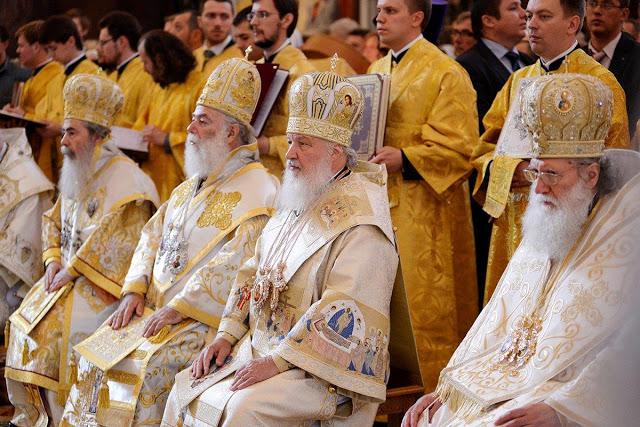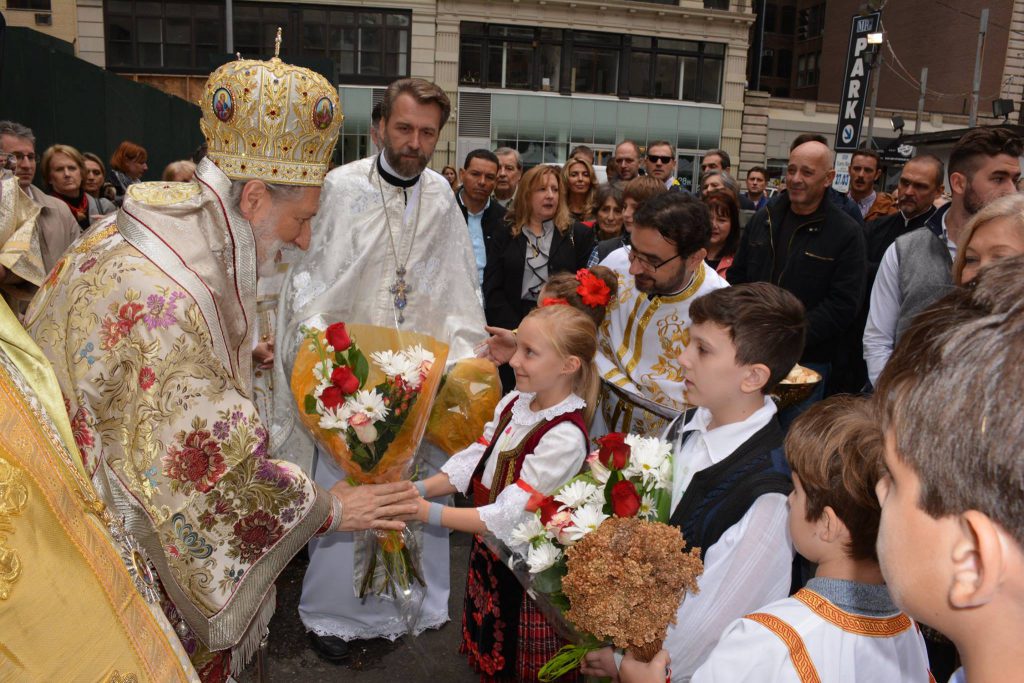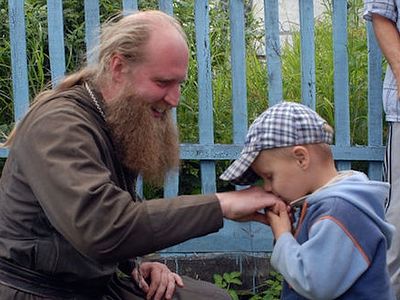You may have seen an Orthodox priest or bishop before and just never realized it. They are hard to miss, honestly, with their beautiful vestments and their (most of the time) long beards. In the Orthodox Church, we hold incredible respect for the clergy. This is because they serve at the altar on behalf of the people and are spiritual fathers who live as icons of Christ. Therefore, when we greet a member of the clergy, we don’t just shake their hand and say, “Hey, nice to meet ya!” In this post, we explain the proper way to greet an Orthodox priest or bishop.
Estimated reading time: 5 minutes
Who are the clergy?
Clergy is the generic term we use to describe the formal religious leadership within the Orthodox Church. The clergy are set aside to take care of the ritual aspects of the Church’s religious life, teach, and help in spreading Orthodox doctrine and practices. They are, essentially, the New Testament version of the Levites.
All clergy in the Orthodox Church are male. Moreover, there is a certain hierarchy in place within the conciliar structure of the global Church. There are four holy orders of governance in the Church: laity (parishioners), deaconate, priesthood, and episcopate (bishops). In this post, we focus on the last two.

Quick aside. Not all vestments will be the color of the ones pictured above. Vestment colors often change throughout the year, symbolizing different seasons (like Great Lent – violet) or commemorating specific events (like the Elevation of the Cross – red).
Greeting with a kiss
In modern American culture, people usually greet each other by shaking hands, hugging, or a peck on the cheek. When greeting a member of the clergy, though, we do things a bit differently. We don’t shake his hand or kiss his cheek. Instead, we kiss his right hand and ask for a blessing. We do this because we seek to honor Christ, whom the priest/bishop represents.
How to greet an Orthodox priest or bishop
Time needed: 1 minute
Here we explain how to greet a priest or bishop in the Orthodox Church.
- Cup your hands in front of you.
Place your right hand over your left, and turn your palms to face upward.
- Bow slightly at the waist and say, “Father/Master bless.”
Asking for a blessing lets the priest or bishop know that you wish to greet him, and he will bless you with the sign of the cross, extend his hand to you, and place it in your cupped palms.
- Kiss the back of the priest or bishop’s hand.
This kiss serves as both a greeting and an acceptance of the blessing the priest/bishop has given you.
Why kiss them, though?
The kiss is an ancient custom signifying love, respect and reverence. The Orthodox keep this practice alive during divine services and fellowship. It is as natural to us as breathing. We kiss icons, holy relics, the Cross, the Gospel, the priest’s hand, and sometimes, the Holy Chalice. And we also often greet each other with a kiss (or two or three) upon the cheek, as people did in Eastern Europe and the Middle East for centuries. We do this because we encounter and experience Christ Himself through these holy things and through one another. If you ever visit an Orthodox Church, expect to see us kissing things (and each other) quite a bit.
Read On: What to Expect in an Orthodox Church >>
Why ask for a blessing?
We greet clergy by asking for and receiving a blessing for a couple reasons. First, it honors the sacred office of the priest or bishop. After all, the hands of these men touch the Holy Body and Blood of Our Lord. Their hands prepare the Holy Gifts for all of us, so we may partake of Holy Communion and experience God in His fullness. The Orthodox fully recognize that the priest is a man, and that he sins, just like we do. But though he is unworthy, he has received the Grace of God to impart spiritual gifts and blessings.
Secondly, asking for blessings is a sign of a humble heart. It reveals a deep faith in the power of God. For example, the woman with a flow of blood touched Christ’s garment to obtain healing, and the Lord praised her great faith. The sinful woman kissed the Lord’s feet in repentance (Lk 7:38). And in the parable of the Prodigal Son, the father runs out to meet the repentant young man and kisses him (Lk 15:20). The Orthodox follow the examples of these individuals, approaching our clergy with humility and faith.
Other times it is appropriate to kiss the hand
The most common use of the hand-kiss in Orthodox tradition and custom is in receiving a blessing from a priest or bishop. But there are other times it might also be acceptable to do this:
- Saying hello or goodbye
- Asking for a blessing before traveling
- Receiving the prayer of absolution at Holy Confession
One time we should never kiss the priest’s hand (or the Chalice) is during Holy Communion. Attempting to do this may cause an accident and result in the Holy Gifts being spilled.
Conclusion
It is important to show respect and reverence to Orthodox priests and bishops when greeting them. After all, they are not just “one of the boys.” They serve as your spiritual fathers, your guides. They are icons of Christ we should all seek to emulate. When you kiss their hands, you show respect for their office — they are the ones who “bless and sanctify” you and who offer the holy gifts on your behalf. So, next time you greet your priest or bishop, do not shake his hand. Instead, ask for his blessing.
Read More: Church Etiquette: The Ultimate Guide >>


